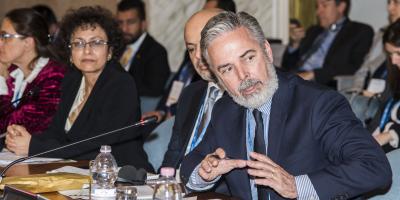
The Rio+20 conference ‘set out the parameters that define sustainable development … it was defined as consisting of three pillars: economic, social, environmental. The (post-2015) agenda … was supposed to concentrate on the inter-connectiveness between the three pillars, having the eradication of poverty as an overarching goal with the sense of leaving no one behind,’ Brazilian Ambassador to the United Nations, Antonio de Aguiar Patriota - one of the chief negotiators involved in the development of the new Sustainable Development Goals - told participants at IDLO’s Partnership Forum in December. The Forum brought together various stakeholders to discuss the linkages between rule of law and sustainable development, and the potential of Goal 16 in the successful implementation of the 2030 Agenda.
Ambassador Patriota – whose country, Brazil, had initially opposed the inclusion of Goal 16 on justice and peace – explained that position further, ‘it is not that we … were trying to diminish the importance of the link between peace and development, but, I think there was a sense that one has to respect the different areas of responsibility within the United Nations, just as the Security Council and its Permanent Members, and the Members of the Council itself, should not be relieved of their responsibilities in promoting peace through other fora in the UN. We felt that if we started having discussions on peace and security within a universal, universally applicable agenda, then, we would have to look at things like military budget, the elimination of weapons of mass destruction, disarmament. And it would not only be peace and security as applicable to the developing world, since we were moving from a MDG type agenda, which was focused on the developing world to a universally applicable world. And whenever we made that argument, then those who were pushing for a peace and security dimension would, of course, say that this is not what we have in mind, we’re actually thinking about the conflicts in Africa, Middle East and so forth. So, it was difficult to make progress along those lines. But ultimately, I think convergence was possible around some core ideas.’
One of the elements that made consensus possible, he continued, was precisely ‘the idea of access to justice itself. Access to justice seemed to us a better term than rule of law when you are speaking of a transformative agenda. The very simple example that I sometimes give is that in a regime such as the apartheid regime in South Africa, you had rule of law, but did you have justice? Was this a fair and just regime?’
‘Where the expression rule of law does enter into Goal 16,’ Ambassador Patriota elaborated, ‘this was made possible because there is reference to international law, which was, again, not an easy discussion to reach consensus on. I am speaking of target 16.3, which speaks of the promotion of the rule of law at the national and international levels to ensure equal access to justice for all. Now, why did many developing countries, Brazil in particular, but others as well, feel that it was important? Because through multilateralism, through the UN system that has been in place now for 70 years, but even before that, in some areas such as labor laws, international parameters have been set, international conventions have been agreed upon… according to which national governments should perform and establish their own rights and obligations.’
‘Another area where we feel there was some misunderstanding and sometimes conflicting views, and even differences in semantics, is in the indiscriminate use of conflict and violence,’ he continued. ‘Now, to our mind, conflict, international conflict in particular, is not going to be solved through a sustainable development agenda, it is going to be solved through the tools provided in the collective security discussions we have within the Security Council in New York at the UN or through peacebuilding mission and other mechanisms... It is very important to our mind to distinguish between high levels of violence that have to do with homicide or public security challenges - that will not be solved through sanctioning regimes or international intervention or peacekeeping operations of the United Nations - and international and peace security challenges that require this kind of approach.’
Highlighting less contentious aspects of the negotiations, Ambassador Patriota emphasized a ‘fourth element that found its way under goal 16, to which we attached importance and that also made consensus easier for many, the fact that goal 16 calls for a greater participation of developing countries in international governance structures…. this is important,’ he added, ‘because, if we were speaking of improving governance domestically, making it more accountable, legitimate, representative, I think there is a strong argument in favor of promoting similar types of structures and governance internationally and worldwide, making them representative, legitimate and fully accountable in the face of the international community.’
‘Now, perhaps, the biggest challenge is in the implementation,’ concluded the Brazilian diplomat.
The opening session of IDLO’s Partnership Forum was followed by two further roundtables looking at the practical experiences of various countries present at the Forum; speakers included the Attorney General of Afghanistan, Mohammad Farid Hamidi, the Attorney General of Myanmar, Htun Htun Oo, the President of the Supreme Court of Paraguay, Alicia Beatriz Pucheta de Correa, the Italian Coordinator for International Activities on Anti-Corruption, Minister Alfredo Durante Mangoni, the Head of the Financial Law Unit at the European Bank for Reconstruction and Development, Jelena Madir, and the Judge President of the High Court of South Africa, Dunstan Mlambo.
Image caption: Ambassador Antonio de Aguiar Patriota speaking at IDLO's Partnership Forum

